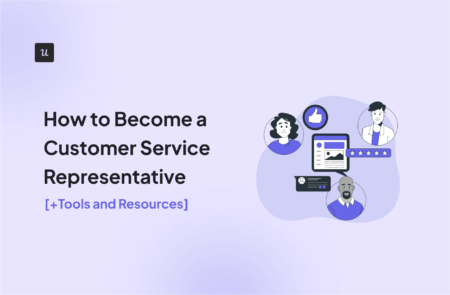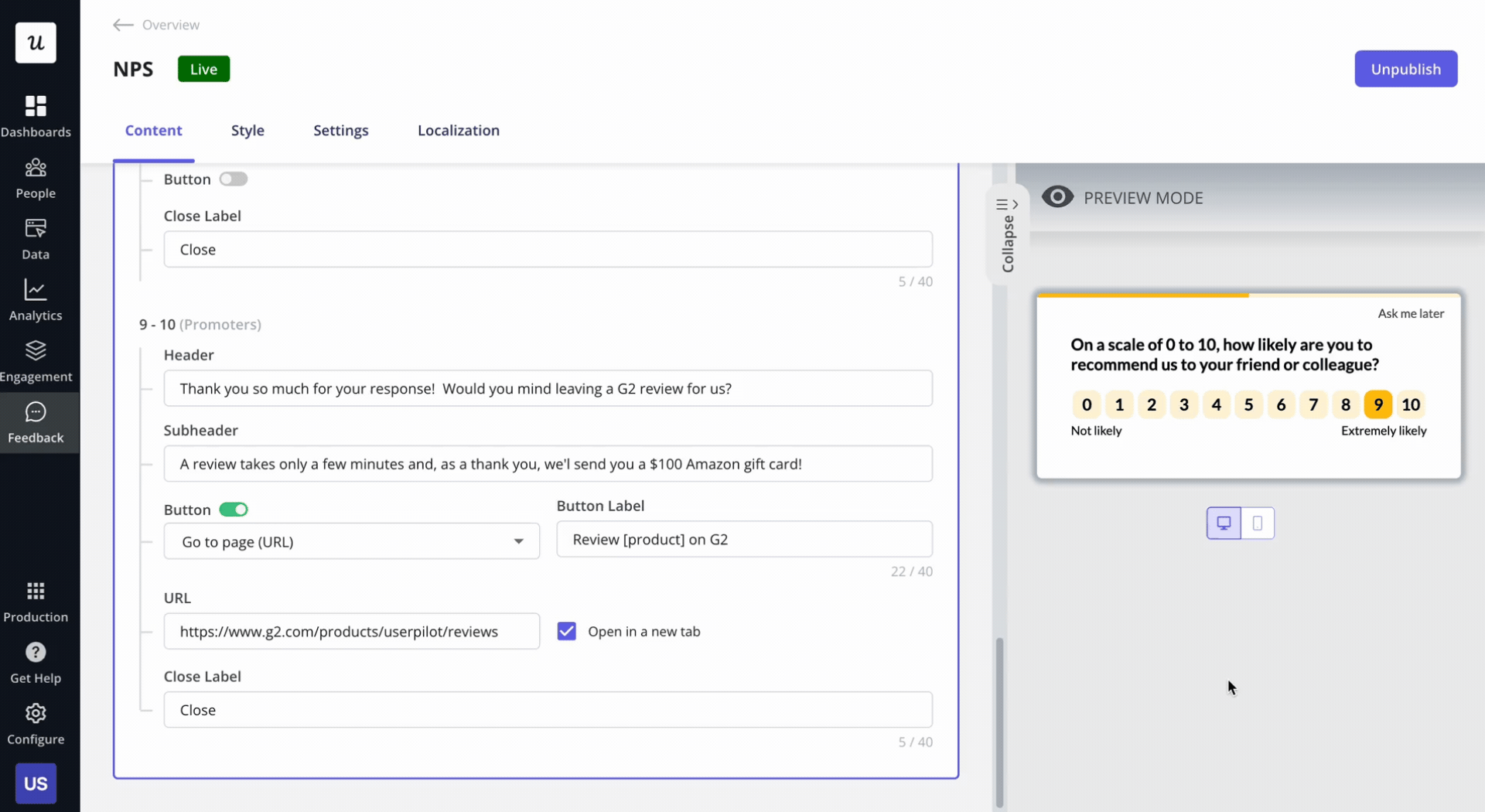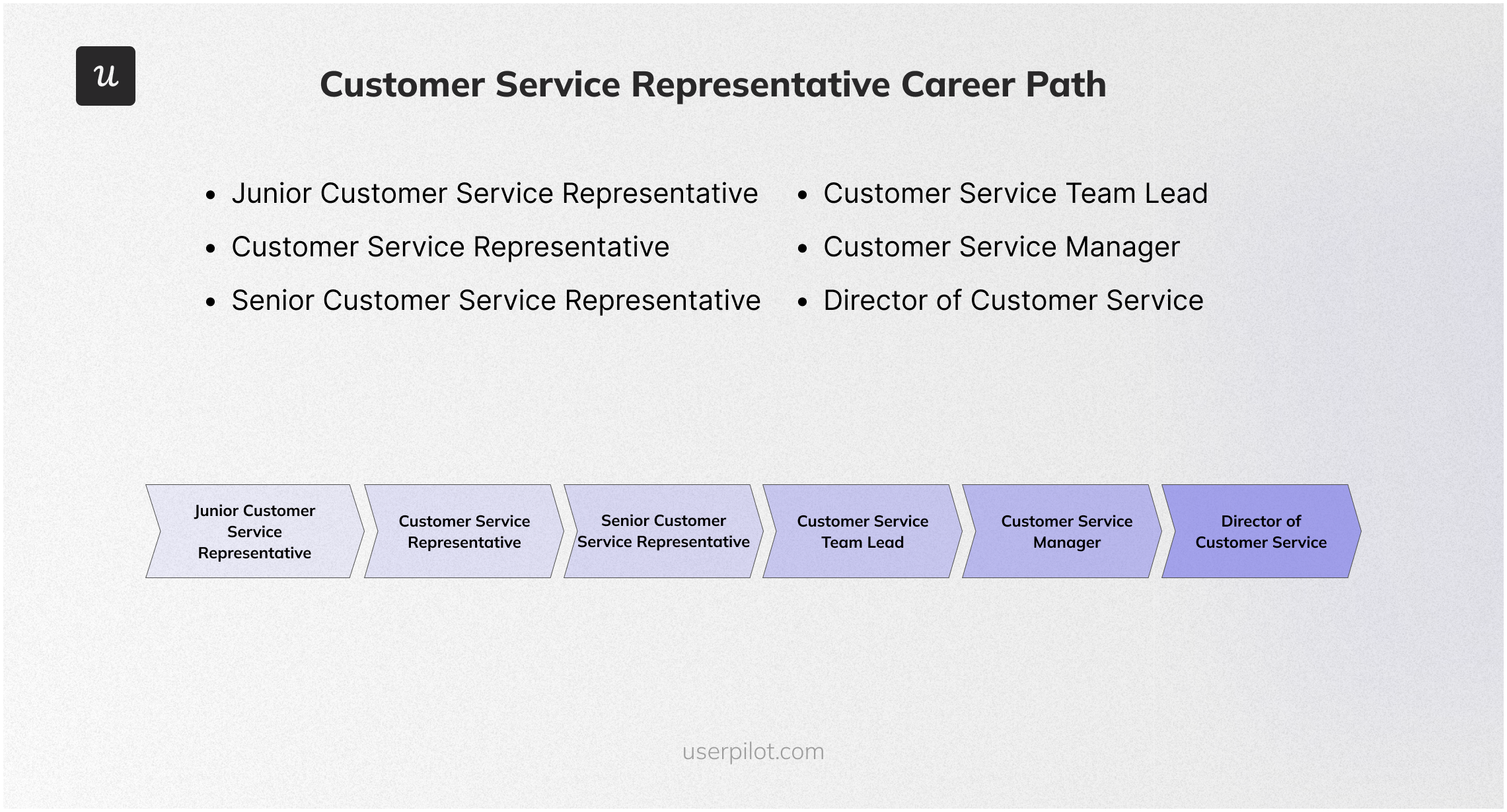
Embarking on a career as a customer service representative involves a combination of education, skills development, and practical experience.
Whether you’re just starting out or looking to transition into this role, understanding the key steps and requirements is essential.
This guide will provide you with a comprehensive overview of the path to becoming a successful customer service representative.
Let’s dive in!
Try Userpilot Now
See Why 1,000+ Teams Choose Userpilot

TL;DR
- A customer service representative acts as a liaison between a company and its customers by providing information and resolving issues. In the SaaS industry, they help users navigate software applications, troubleshoot technical issues, and drive product adoption.
- The typical career path for a customer service representative includes:
- Junior Customer Service Representative (handles customer inquiries and resolves basic issues)
- Customer Service Representative (manages more complex issues and conducts training)
- Senior Customer Service Representative (resolves complex issues, leads training, and mentors the team)
- Customer Service Team Lead (manages a team and develops support strategies)
- Customer Service Manager (oversees the entire department and develops goals and procedures)
- Director of Customer Service (sets strategic direction and leads cross-functional initiatives)
- To become a customer service representative, obtain a high school diploma or equivalent, consider further education, develop relevant skills, gain practical experience, and pursue certifications.
- Customer service representatives utilize a variety of tools to enhance their efficiency. Some essential tools include Userpilot for user onboarding, Zendesk for customer support management, and Freshdesk for ticketing and customer communication.
- Looking into tools for customer service representatives? Userpilot is an all-in-one product platform with engagement features and powerful analytics capabilities. Book a demo to see it in action!
What is a customer service representative?
A customer service representative is a professional who acts as a liaison between a company and its customers by providing helpful information and resolving emerging issues.
In the SaaS industry, a CSR helps users navigate software applications, troubleshoot technical issues, and drive product adoption.
Customer service representative’s main responsibilities
Here’s a breakdown of a customer service representative’s main task:
- Respond to customer inquiries: Provide different types of customer support, address customer questions and concerns via phone, email, or live chat.
- Provide product support: Assist customers with using the software, including troubleshooting and resolving technical issues.
- Conduct software demonstrations: Guide customers through product features and functionalities to help them maximize the product’s value.
- Manage customer accounts: Handle account setups, updates, and cancellations efficiently.
- Resolve technical issues: Diagnose and troubleshoot software problems, escalating complex issues to the technical support team when necessary.
- Document customer interactions: Maintain detailed records of customer interactions, issues, and resolutions in the company’s CRM system.
- Collaborate with other teams: Work closely with product development, sales, and marketing teams to relay customer feedback and contribute to product improvements.
- Provide training and onboarding: Help new customers get started with the software through onboarding sessions and training materials.
- Monitor product performance: Keep an eye on software performance and proactively address any recurring issues that could impact customer experience.
- Stay updated on product changes: Continuously learn about new features, updates, and best practices to provide accurate and current information to customers.
- Assist in developing help resources: Contribute to creating and updating FAQs, user guides, and other support documentation.
- Gather customer feedback: Collect and report customer feedback to help the company improve its products and services.
- Upsell and cross-sell products: Identify opportunities to recommend additional features or products that may benefit the customer.
Customer service representative career path
A career in customer service offers numerous opportunities for growth and advancement. Starting from a junior role, individuals can progress through various levels of responsibility and leadership, eventually reaching executive positions within the field.
Here’s a brief overview of the typical career path for a customer service representative.
- Junior Customer Service Representative: Handles customer inquiries via phone, email, and chat, resolves basic issues, and escalates complex problems. Progress by gaining experience, improving communication and problem-solving skills, and taking relevant training or certifications.
- Customer Service Representative: Manages more complex issues, conducts training sessions, collects and analyzes customer feedback, and mentors junior staff. Progress by gaining advanced certifications, and developing leadership skills.
- Senior Customer Service Representative: Resolves complex issues, leads training initiatives, analyzes customer service metrics, and mentors the team. Progress by gaining leadership experience, strategic planning skills, and further education (such as an MBA) in management.
- Customer Service Team Lead: Manages a team, develops support strategies, handles escalations, and coordinates with other departments. Progress by managing larger teams, developing strategic planning skills, and demonstrating successful team performance.
- Customer Service Manager: Oversees the entire department, develops goals and procedures, coordinates with other teams, and manages the budget. Progress by gaining upper management experience, pursuing advanced education in business management, and leading a successful department.
- Director of Customer Service: Sets strategic direction, leads cross-functional initiatives, develops long-term plans, and reports to senior executives. Progress by demonstrating success in leading large-scale support initiatives.
How to become a customer service representative?
Becoming a customer service representative involves several steps, from education to gaining practical experience.
Here is a step-by-step guide to help you start your career in this field:
- Obtain a High School Diploma: The minimum educational requirement for most customer service representative positions is a high school diploma or equivalent.
- Pursue Further Education: While not always required, obtaining a bachelor’s degree in a related field such as business, communications, or psychology can be beneficial and make you more competitive in the job market.
- Develop Relevant Skills: Focus on building key skills such as communication, problem-solving, and computer literacy. These skills are essential for effectively assisting customers and handling various inquiries.
- Gain Practical Experience: Start with entry-level positions or internships in customer service roles. Practical experience in a customer-facing role will provide you with valuable insights and skills needed for the job.
- Consider Certifications: Pursuing certifications such as Certified Customer Service Professional (CCSP) or other relevant certifications can enhance your resume and demonstrate your commitment to the profession.
- Apply for Jobs: Once you have the necessary education and experience, start applying for customer service representative positions. Customize your resume and cover letter to highlight your relevant expertise.
- Continue Learning: Stay updated on the latest customer service trends and best practices. Continuous learning and professional development are crucial for advancing in your career and providing exceptional service.
What skills should a customer service representative have?
A customer service representative needs a combination of hard and soft skills to be successful in their role. Here are some of the most essential skills CSM needs:
- Communication skills: Effective verbal and written communication ensures clear and concise interactions with customers, helping to accurately understand and address their needs.
- Problem-solving abilities: Strong problem-solving skills allow CSRs to quickly diagnose and resolve customer issues, minimizing downtime and enhancing the customer experience.
- Technical proficiency: Familiarity with the company’s products and related technology enables CSRs to provide accurate support and troubleshoot technical problems efficiently.
- Empathy and patience: Demonstrating empathy and patience helps build rapport with customers, making them feel valued and understood.
- Attention to detail: A keen eye for detail ensures that customer issues are accurately documented and resolved, preventing future problems and maintaining high-quality service.
- Time management: Efficiently managing time allows CSRs to handle multiple customer inquiries and issues promptly, maintaining service level agreements (SLAs) and customer satisfaction.
- Conflict resolution: Strong conflict resolution skills enable CSRs to handle difficult situations calmly and professionally, turning potentially negative experiences into positive ones.
Best certifications for customer service representatives
Investing in certifications is a strategic way to advance your career as a customer service representative.
Earning these credentials not only enhances your skills but also demonstrates your commitment to providing exceptional service, which can lead to better job opportunities and higher pay.
Here are some valued certifications to add to your CV:
- Certified Customer Service Professional (CCSP) – Offered by the National Customer Service Association (NCSA), this certification covers essential customer service skills, communication, problem-solving, and relationship management.
- Customer Service & Support (CSS) Certification – Provided by the International Customer Management Institute (ICMI), this certification focuses on best practices in customer service, handling customer interactions, and improving service delivery.
- Certified Support Professional (CSP) – Offered by HDI, this certification is designed for front-line customer service professionals, emphasizing incident management, communication, and service ethics.
- Certified Contact Center Associate (CCCA) – Also provided by ICMI, this certification is ideal for those working in contact centers, focusing on customer interaction techniques, call management, and service excellence.
- Customer Experience Specialist (CXS) – Provided by the Customer Experience Professionals Association (CXPA), this certification focuses on creating positive customer experiences, understanding customer needs, and improving customer interactions.
Best resources for customer service representatives
As a customer service representative, you’re constantly seeking new insights, strategies, and inspiration to keep your customers engaged and loyal.
Let’s explore some of the top resources that can help you succeed as a customer service representative.
Best books for customer service representatives
Here are some top book recommendations for customer service representatives, curated from reputable online sources:
- “How to Win Friends and Influence People” by Dale Carnegie: This classic book offers timeless advice on building positive relationships and effectively communicating with customers. Carnegie’s principles can help customer service representatives create lasting impressions and resolve conflicts amicably.
- “The Customer Rules: The 39 Essential Rules for Delivering Sensational Service” by Lee Cockerell: Written by a former Disney executive, this book provides practical tips and real-life examples to help customer service reps deliver exceptional service.
- “Hug Your Haters: How to Embrace Complaints and Keep Your Customers” by Jay Baer: Baer emphasizes the importance of addressing customer complaints and turning negative experiences into positive ones.
- “Crucial Conversations: Tools for Talking When Stakes Are High” by Kerry Patterson, Joseph Grenny, Ron McMillan, and Al Switzler: Effective communication is essential in customer service. This book offers tools for navigating difficult conversations and resolving conflicts, which are crucial skills for any customer service representative.
- “Customer Service Tip of the Week: Over 52 Ideas and Reminders to Sharpen Your Skills” by Jeff Toister: Toister’s book offers practical tips and reminders that can be implemented weekly to improve customer service skills. It’s a quick read with actionable advice that can make a significant impact over time.
Best webinars for customer service representatives
Enhance your customer service skills with these top webinars designed for customer service representatives.
- Userpilot: “Enhancing Customer Experience through Effective Onboarding”: This webinar from Userpilot covers essential strategies for improving customer experience by focusing on the onboarding process. It includes practical tips and real-life examples to help customer service representatives make a positive first impression.
- HubSpot: “Customer Service Training: How to Provide Better Support”: HubSpot’s webinar offers comprehensive training on delivering excellent customer service. It covers various aspects such as communication skills, handling difficult customers, and utilizing technology to enhance support.
- Zendesk: “Customer Service Best Practices for 2024”: This webinar from Zendesk focuses on the latest trends and best practices in customer service. It provides insights into leveraging new technologies, improving response times, and creating a customer-centric culture.
- Salesforce: “Transforming Customer Service with AI and Automation”: Salesforce explores how AI and automation can revolutionize customer service. The webinar covers practical applications of AI, how to implement customer service automation and the benefits of these technologies for both customers and service teams.
- LinkedIn Learning: “Customer Service: Handling Abusive Customers”: LinkedIn Learning offers a webinar dedicated to handling difficult and abusive customers. It provides practical techniques for de-escalation, maintaining professionalism, and protecting mental health while dealing with challenging situations.
Best blogs for customer service representatives
Blogs are accessible and quick way to obtain knowledge as a customer service representative.
Here are some of our favorites to check out:
- Userpilot Blog: Userpilot’s blog offers in-depth articles on customer experience, onboarding processes, and user engagement. It’s a go-to resource for practical tips and strategies to improve customer retention.
- Help Scout Blog: The Help Scout blog covers a wide range of customer service topics, including communication skills, customer support metrics, and best practices. It’s an excellent resource for both new and experienced customer service representatives.
- Groove Blog: Groove’s blog is dedicated to helping small businesses improve their customer service. It offers actionable advice, success stories, and practical tips to enhance your customer support efforts.
- Shep Hyken’s Customer Service Blog: Shep Hyken, a customer service expert, shares his knowledge and experiences through his blog. It covers various aspects of customer service, including customer loyalty, service culture, and effective communication.
- The Effortless Experience Blog by CEB (now Gartner): Based on the concepts from the book “The Effortless Experience,” this blog explores how to reduce customer effort and improve service delivery. It provides data-driven insights and practical tips for creating a seamless customer experience.
Best podcasts for customer service representatives
Podcasts are a great resource for customer service representatives because they offer convenient, on-the-go access to expert insights to enhance their skills and knowledge.
Here are some of the best ones:
- “The Customer Support Leaders” by Charlotte Ward: This podcast features interviews with customer support leaders from various industries.
- “Call Center Helper Podcast”: Focused on call center operations, this podcast provides tips and advice on managing call centers effectively. Topics include improving call handling, boosting team morale, and leveraging technology for better service.
- “The Effortless Experience” by Matthew Dixon: Based on the book, this podcast explores the concept of making customer interactions easy and frictionless. It offers actionable strategies for reducing customer effort and increasing loyalty.
- “Crack the Customer Code” by Adam Toporek and Jeannie Walters: This podcast covers a wide range of customer service topics, from handling complaints to creating memorable customer experiences. The hosts interview industry experts and share practical advice for improving customer service.
- “Focus on Customer Service” by Dan Gingiss: Dan Gingiss highlights companies that are excelling in customer service through social media. Each episode showcases real-world examples and provides tips for leveraging social media to enhance customer support.
Best tools for customer service representatives
It’s always a smart idea to invest in cutting-edge technology to streamline your customer service.
Below, we’ve compiled a list of tools for customer service representatives. Each one is tailored to meet specific needs, helping you provide outstanding support and elevate customer satisfaction to new heights.
- Best tool for user onboarding – Userpilot: Userpilot helps you create personalized onboarding experiences to guide new users through your product, ensuring a smooth start and increasing user retention.
- Best tool for project management – Monday: Monday offers a visual platform for managing customer service projects, tracking tasks, and collaborating with your team to ensure efficient workflow management.
- Best tool for product management – Jira Software: Jira Software allows you to track and manage customer service issues, prioritize tasks, and streamline workflows, making it easier to address customer needs promptly.
- Best tool for customer experience – Zendesk: Zendesk provides a comprehensive customer service platform that includes ticketing, live chat, and knowledge base features, helping you deliver consistent and effective support.
- Best tool for customer success – ClientSuccess: ClientSuccess helps you manage customer relationships, track success metrics, and proactively address customer needs to ensure long-term satisfaction and retention.
- Best tool for data analytics – Tableau: Tableau enables you to visualize and analyze customer service data, providing insights that can help you make informed decisions and improve service quality.
- Best tool for knowledge management – Confluence: Confluence allows you to create, share, and organize documentation, ensuring your team has access to the information they need to provide efficient support.
- Best tool for customer support – Freshdesk: Freshdesk offers a user-friendly platform for managing customer inquiries, automating repetitive tasks, and improving response times, making it easier to deliver high-quality support.
- Best tool for customer feedback – HubSpot Service: HubSpot Service provides tools for collecting and analyzing customer feedback, helping you understand customer needs and improve your service offerings based on real insights.
- ChurnZero – Best for churn prediction and customer health scoring: This tool uses machine learning to identify customers at risk of churning and offers insights on how to intervene.
Customer service representative FAQs
- What are your skills as a customer service representative?
I excel in communication, problem-solving, empathy, active listening, and managing difficult situations with a positive attitude.
- What are the duties and responsibilities of customer service?
Duties include assisting customers with inquiries, resolving issues, processing orders, providing product information, and managing product experience.
- What is a good customer service representative?
A good customer service representative is empathetic, patient, knowledgeable, and efficient in resolving customer issues while maintaining a positive attitude.
- How to handle customer complaints?
Listen actively, acknowledge the issue, apologize sincerely, offer a solution, and follow up to ensure the problem is resolved to the customer’s satisfaction.
Conclusion
Becoming a successful customer service representative requires dedication, continuous learning, and a proactive approach to developing relevant skills.
By following the outlined steps and leveraging the resources available, you can effectively navigate your career path and achieve your professional goals.
We hope this guide has provided you with valuable insights and practical advice to help you on your journey to becoming a proficient and impactful customer service representative!
Looking into tools for customer service representatives? Userpilot is an all-in-one product platform with engagement features and powerful analytics capabilities. Book a demo to see it in action!









